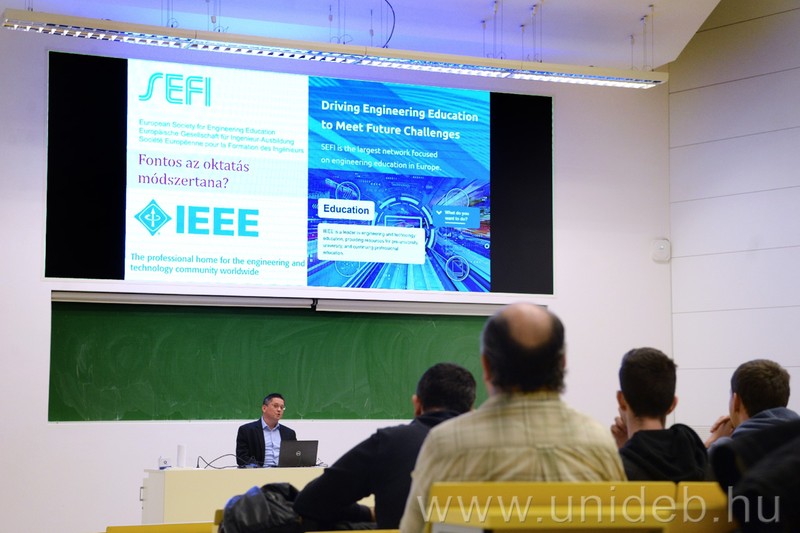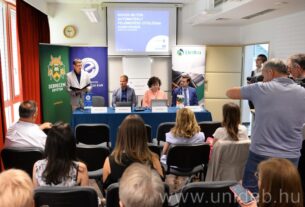In connection with the Hungarian Science Festival, academic lectures and a round table discussion were held at the Faculty of Science and Technology of Debrecen under the title Creating value in the educational process – Creating synergy between subjects in engineering education.
Péter Korondi, a professor at the Faculty of Science and Technology of the University of Debrecen, said: in education, knowledge must be transmitted in a systematic way, and the generally accepted method of systematization is to categorize knowledge into subjects. On the other hand, in practical life, problems are not categorized according to subjects.
He explained: that really talented students can bridge this contradiction in their engineering work, but there are many students for whom this is a serious problem during their university studies. Many students cannot connect what they have learned in different subjects. For example, he learns the theory of differential equations given by mathematicians, and if he is given a differential equation written in mathematical form, he can solve it according to the template given in the mathematics subject, but if he is given a technical problem, he cannot even write the differential equation for it, let alone solve it. This also means that many students cannot put the learned theory to practical use.
We can complain that this is terrible and such a person should not be given any engineering degree. Our firm position is that instead, we should try to help these students and not tell them that we are not good enough, because the industry also requires their work, of course not as research engineers. If we want to describe the path we started on with one word, then that word is synergy
– said Péter Korondi.
According to Sándor Hajdu, deputy head of the Department of Mechanical Engineering at DE MK, the synergy of the subjects can only be created if the instructors can work together, so it is very important that the program has instructors from three different fields (electrical engineer Péter Korondi, mathematician Imre Kocsis, traffic engineer Sándor Hajdu) joined together, but behind them are other enthusiastic young instructors who meet the students during the exercises. It is really decided there whether the subject synergies devised by the head teachers will also appear at the practical level.
Sándor Hajdu emphasized: I would also like to create synergy between the fields of science and subjects used in engineering practice, as well as theory and practice. They want to achieve this by examining two selected problem areas in several subjects, using several approaches, and as the studies progress, they try to examine them more and more thoroughly, thus giving more and more complex answers.
The two problem areas are seemingly far from each other, but in their mathematics, they are almost completely identical, and this is also an important message to the students. If we have an engineering problem, it can often be helped to solve by adapting a solution seen in a completely different field
– explained the scientific deputy dean of the Faculty of Science and Technology.
Imre Kocsis said: one of the problem areas is the vehicle’s wheel suspension, during which the students examine cases such as what happens when the vehicle passes through a roadblock at different speeds, when the wheel lifts off the ground when the suspension hits, and when the car body hits the ground, and finally, how to remedy this with active shock absorption in a modern vehicle.
The other problem area is the online measurement of an electric motor. The fact that the measurement can be taken at any time, even after midnight, is attractive to students in itself. The students will encounter solutions to IT, measurement, and signal processing, as well as a wide variety of regulatory problems, added the academic deputy dean.
unideb.hu


















